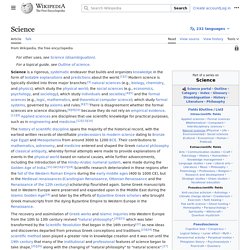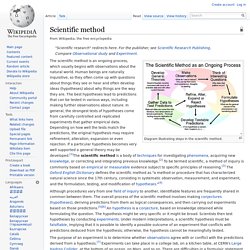

Science. Systematic enterprise that builds and organizes knowledge The Universe represented as multiple disk-shaped slices across time, which passes from left to right Modern science is typically divided into three major branches that consist of the natural sciences (e.g., biology, chemistry, and physics), which study nature in the broadest sense; the social sciences (e.g., economics, psychology, and sociology), which study individuals and societies; and the formal sciences (e.g., logic, mathematics, and theoretical computer science), which study abstract concepts.

There is disagreement,[19][20][21] however, on whether the formal sciences actually constitute a science as they do not rely on empirical evidence.[22][20] Disciplines that use existing scientific knowledge for practical purposes, such as engineering and medicine, are described as applied sciences.[23][24][25][26] History Early cultures. Scientific method. Diagram illustrating steps in the scientific method.

The scientific method is an ongoing process, which usually begins with observations about the natural world. Human beings are naturally inquisitive, so they often come up with questions about things they see or hear and often develop ideas (hypotheses) about why things are the way they are. The best hypotheses lead to predictions that can be tested in various ways, including making further observations about nature. In general, the strongest tests of hypotheses come from carefully controlled and replicated experiments that gather empirical data. Depending on how well the tests match the predictions, the original hypothesis may require refinement, alteration, expansion or even rejection.